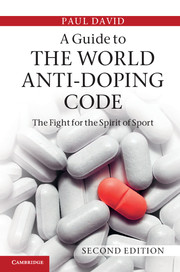Book contents
- Frontmatter
- Contents
- List of Figures
- Preface to the Second Edition
- Table of Cases
- Introduction
- 1 The development of principles relating to anti-doping regimes: the role of the Court of Arbitration for Sport
- 2 Overview of the Code and the World Anti-Doping Program
- 3 The International Standards in more detail
- 4 The nature of the Code and its interpretation and application
- 5 Articles 1 and 2 of the Code: anti-doping rule violations under the Code
- 6 Article 3 of the Code: the proof of anti-doping rule violations under the Code
- 7 Responsibility for testing and investigations, results management and hearings
- 8 Articles 9 and 10 of the Code: sanctions for anti-doping rule violations
- 9 Article 13: appeals under the Code
- 10 Appeals to the Swiss Supreme Court from CAS, challenges to the Code in the courts and claims outside the Code
- 11 The way ahead: review of the 2009 Code
- Index
Preface to the Second Edition
Published online by Cambridge University Press: 05 February 2013
- Frontmatter
- Contents
- List of Figures
- Preface to the Second Edition
- Table of Cases
- Introduction
- 1 The development of principles relating to anti-doping regimes: the role of the Court of Arbitration for Sport
- 2 Overview of the Code and the World Anti-Doping Program
- 3 The International Standards in more detail
- 4 The nature of the Code and its interpretation and application
- 5 Articles 1 and 2 of the Code: anti-doping rule violations under the Code
- 6 Article 3 of the Code: the proof of anti-doping rule violations under the Code
- 7 Responsibility for testing and investigations, results management and hearings
- 8 Articles 9 and 10 of the Code: sanctions for anti-doping rule violations
- 9 Article 13: appeals under the Code
- 10 Appeals to the Swiss Supreme Court from CAS, challenges to the Code in the courts and claims outside the Code
- 11 The way ahead: review of the 2009 Code
- Index
Summary
Recently, an anti-doping expert with many years’ experience in the field told me that he had encountered more difficult issues in his work in the past twelve months than in the past twelve years. This comment and others like it, together with my own experiences in working with the legal issues arising in the anti-doping area has prompted the writing of the second edition of this guide to the World Anti-Doping Code.
While the regulation of doping in sport has been a fast-moving field over the past decade, there has been a quickening of the pace in the last three years, since the publication of the first edition of this text. The obvious change in the regulatory framework since the first edition has been the adoption, from 1 January 2010, of the 2009 Code by Signatories to the Code. The significant changes brought about by the 2009 Code, in particular in relation to the imposition of sanctions, means that the process of hearing and determining particular periods of ineligibility has become complex. The new Code has been accompanied by revised International Standards and Guidelines. However, the increase in activity in the field is not simply the result of changes in the rules. Rather several factors have worked together to produce an increase in investigative work and inquiries by anti-doping organisations and more allegations before sports tribunals and the Court of Arbitration for Sport (CAS) in which the provisions of the 2009 Code and operation of new Standards and Guidelines have had to be considered. Anti-doping organisations have focused increasingly on the investigation of violations under the Code which are not established by testing alone, and new rules in Standards and Guidelines relating to matters such as athlete whereabouts and biological passports have provided more data on which these investigations can be based. State authorities have also become increasingly involved in anti-doping regulation and investigation under applicable national laws whether sport-specific criminal or general public health legislation. This has made more information available to anti-doping organisations under the Code and given greater impetus to their investigations, as well as giving rise to difficult legal issues where the provisions of national law and the rules under the Code come into potential conflict.
- Type
- Chapter
- Information
- A Guide to the World Anti-Doping CodeA Fight for the Spirit of Sport, pp. vii - ixPublisher: Cambridge University PressPrint publication year: 2013

